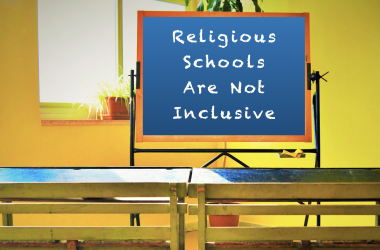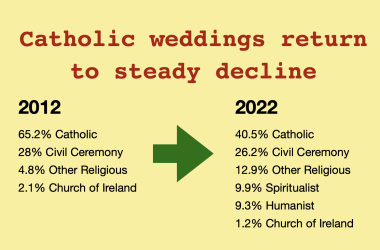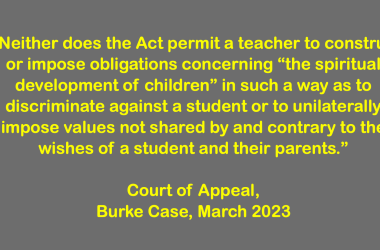We have recently sent the following letter to the Oireachtas Education Committee. Letter from Atheist Ireland to Oireachtas Education Committee Can you please add this to the file of information from Atheist Ireland that the Committee is considering. "Section 62-7(n) of the Education (Admission to Schools) Act 2018. A ruling ...
The Department of Eduction is continuing the fiction that the government is transferring patronage of Catholic primary schools in any meaningful way. The Department is also complicating the matter by saying that parents of pupils at Catholic primary schools are to be surveyed to assess the level of support for ...
According to the Supreme Court, the reason there is a right to home school in our Constitution is because of the right to freedom of conscience. Article 42.2 guarantees the right to home school, and this right was upheld by the Supreme Court in the Burke case in 2022. The ...
We don’t accept claims by church and state that publicly funded religious schools, particularly Catholic schools which are the majority, are inclusive and welcome and respect everyone equally. The reason we don't accept these claims is that the evidence of reality contradicts them, and we experience the injustice and hurt ...
The courts in Ireland have found that parents have a constitutional right to have religious education and religious formation in publicly funded schools. In order to remove this right from the Constitution, we would need a referendum. Any legislation that forbids religious education and formation in schools would be unconstitutional. ...
The number of Catholic weddings has recovered from its dramatic drop during Covid, and has returned to the pattern of steady decline that has been happening for the past decade. In the decade since 2012, the percentage of Catholic weddings has dropped from 65.2% to 40.5%, and nonreligious weddings (civil ...
The Court of Appeal found that, when it interprets the obligations of a Board of Management under the Education Act 1998, it must have regard to the terms of the European Convention on Human Rights. Probably no Board of Management in the country is even aware what obligations they have ...
Atheist Ireland had a constructive meeting this week with the Catholic Education Partnership, the body that coordinates Catholic education in Ireland. We met in Maynooth with chief executive officer Alan Hynes and chairperson Marie Griffin, and we have arranged a follow-up meeting to further discuss these issues: The right to ...
Atheist Ireland has written again to the Oireachtas Education Committee regarding an anti-abortion video shown to students during curriculum Religious Education in an Irish school. Here is the letter we have written. We refer to our letter to the Committee on 21st August 2021 regarding, among other issues, an anti-abortion ...
The Court of Appeal in the Burke case has confirmed that schools and teachers cannot impose the values/ethos of the school on students, if those values are against the conscience of their parents. Schools and Patron bodies believe that under Section 9 (d) of the Education Act they are legally ...
Necessary cookies are absolutely essential for the website to function properly. This category only includes cookies that ensures basic functionalities and security features of the website. These cookies do not store any personal information.
Analytical cookies are used to understand how visitors interact with the website. These cookies help provide information on metrics the number of visitors, bounce rate, traffic source, etc.
Performance cookies are used to understand and analyze the key performance indexes of the website which helps in delivering a better user experience for the visitors.
Advertisement cookies are used to provide visitors with relevant ads and marketing campaigns. These cookies track visitors across websites and collect information to provide customized ads.
Functional cookies help to perform certain functionalities like sharing the content of the website on social media platforms, collect feedbacks, and other third-party features.







